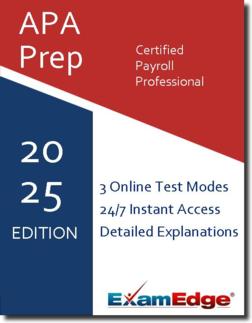APA Certified Payroll Professional (CPP) Practice Tests & Test Prep by Exam Edge - Test Reviews
Based on 28 Reviews
- Real Exam Simulation: Timed questions and matching content build comfort for your APA Certified Payroll Professional test day.
- Instant, 24/7 Access: Web-based APA Certified Payroll Professional practice exams with no software needed.
- Clear Explanations: Step-by-step answers and explanations for your APA exam to strengthen understanding.
- Boosted Confidence: Reduces anxiety and improves test-taking skills to ace your APA Certified Payroll Professional (CPP).

APA Certified Payroll Professional (CPP) Practice Tests & Test Prep by Exam Edge - Review
APA Certified Payroll Professional - Reviews
Excellent
Based on
140
reviews
See why our users from 154 countries love us for their exam prep! Including 28 reviews for the APA Certified Payroll Professional exam.
Exam Edge is an Industry Leader in Online Test Prep. We work with our Institutional Partners to offer a wide array of practice tests that will help you prepare for your big exam. No Matter how niche field of interest might be, were here to help you prepare for your test day.
| 2.8M | 4.5M | |
| Users | Tests Taken | |
| 100K | 19 | |
| Unique Exams | Years in Business | |


